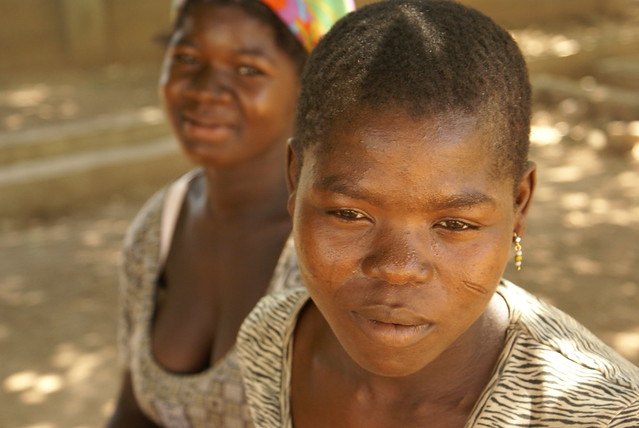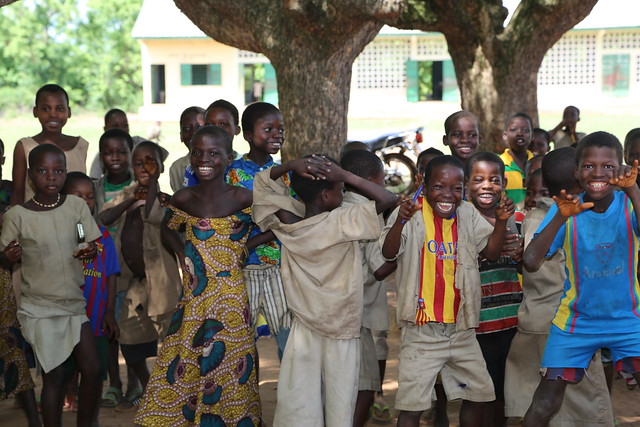
“Believe!” shouted the preacher, flinging his fingers wide to the crowd of sweating believers who sat in a vast array of folding chairs before him. Koffi stood next to the preacher at a two-man pulpit that his uncle had built out of spare chipboard days earlier. It had a nice sloping top covered with fabric and some kind of foam padding underneath, a non-slip surface on which their King James and Ewe Bibles (still in traditional paper form, of course) could rest along with copies of the Sacred Acts and Songs and Hymns of Zion.
The uncle had done a fine job, except for one thing. He hadn’t bothered to nail the box down to the stage where they stood. All the fancy fabric and careful sanding and bright paint were buried in Koffi’s annoyance about that key fact, as he felt the pulpit slide ever so slightly forward, again and again, from the preacher leaning against it. And it was lurching alarmingly now, with the preacher doing his fervent rendition of the blessing gesture.
As Koffi belted out the Ewe version of that one powerful English word (“Xɔse!”), even as he flung out the imaginary Blood with his own fingers (just one hand) in faithful mimicry of his Ghanian brother’s body language as well as the (translated) spoken word, he tugged back a little on the box. The preacher’s fervent presence loomed inches away, his arms and words suspended in time and space for this latest brief interruption of the Spirit that side-by-side translation constantly required. He never noticed as Koffi tugged the box back against his waist.
All through Services as Koffi sat dreading his translation turn, he’d watched the stupid thing inch toward the edge of the stage. With each preacher’s blessing and finger-pointed warning about the wages of sin, there was another scrape and little nudge forward. Why didn’t somebody just nail it down? It irritated him more than it should have, watching the space shrink between the edge of the platform and this slanted box with “200 Years of Awakening” printed on the side, a crossed pair of fresh-cut palm fronds draped over the stenciled letters.
What would happen if it finally ran out of room? Would he be the only one to notice even as the back of the box started to hang over the edge? He’d imagined the thing teetering over the elders in the front row as some preacher found himself–and his roving pulpit–especially moved by the Spirit, pounding away at the devil, the world, and his own flesh.
The rest of the incantation was following now, sure as the heat after dawn. “Believe allya sins forgiven!” the preacher’s words soared forth with that heavy accent of English-is-the-official-language-but-not-really western Ghana. “Believe dem all forgiven in da name an’ blood of Jesus!”
As the words of the old verbal formula rang out in the crowded hall, Koffi reflexively got his tongue into position for the Ewe version. The damn box slid forward again from some further hand-waving by the preacher, and as Koffi translated and offered his own muted gesture, he again yanked it back.
Then those chairs–he’d spent hours Friday morning helping to set them up–creaked in a tired wooden chorus as five thousand worshipers rose to their feet shouting, “We believe!” Koffi watched the sea of color and motion beyond the stage. He still loved this part and, he suspected, the preachers who triggered all that motion did, too.
The spectacle of it! With a few powerful words yelled out a bit louder than the rest, the place erupted into a frenzy of redemption. And it happened every time. The pale upturned palms of ten thousand hands darted and swirled above pastel dress shirts and brightly colored dresses. Starbursts of reflected light sparkled off the women’s gold earrings dangling and shaking with their heads.
“Believe!” shouted the preacher again.
“Xɔse!” Koffi dutifully repeated the shout, translated, as if anybody could fail to understand that word in either language, in Lomé or Accra, after hearing it several times a Sunday for years on end.
“All sins forgiven!” came the chorus from the congregation. In English. Absolutely everybody in Togo and eastern Ghana knew the keywords–“forgiveness,” “sin,” “kingdom,” etc.–from much repetition of them at services. Those few verbal seeds that the American missionaries brought over forty years ago were under constant cultivation. A lot of Togolese knew a great deal more English from the TV programs they watched on their private little screens and didn’t talk about. There might not be a lot of cars on the roads, or people with any concern left for trivial stuff like nailing down a pulpit, but they sure did have their screens.

The preacher paused to let the moment linger. Shouts of rejoicing sprang up throughout the hall. The Blood had done its work. Consciences were clean and joyous, including Koffi’s, which had been nagging vaguely at him during the service about his never-ending stream of doubts.
He’d never experienced the nagging sensation before his conversion ten years ago. It felt sort of like his annoyance about the box-pulpit, except with some guilt mixed in. Guilt about stuff he’d needed to be told was sinful, stuff he’d been just fine with doing all the way up until then.
It was funny, really. Even the night after he’d stuck his hand in the air to get in on the joy that those two white missionary preachers were offering, he went home and caught up on a couple episodes of that great old American show about the chem teacher gone bad, popped open a bottle of Awooyo, and still he felt the glow his friends had talked about. Not from the beer, but the service and his conversion.
All sins forgiven? Cool! Whatever they are, sure glad they don’t count! Later, of course, he was “instructed,” and had to ward off the new feeling of conscience to get through the last episode (watched, naturally, on his private little screen) and finally see Walter White slump dead against a stainless-steel meth vat.
Why didn’t the guilt hit Koffi’s tender new Holy Ghost-guided conscience right away? Why’d he have to learn, from somebody else, what to feel guilty about? Sensing the looming peril of yet another doubt so fresh from hearing the blessing from his Ghana brother here standing right next to him, Koffi steered his mind to safer waters. Believe, yes, he sure wanted to believe. Like all of them out there did. Probably.
“We are all sinners,” the preacher said, “but tonight when God scrolls through dat Book of Life, he sees no sin.”
“No sin,” a few voices shouted back from the crowd after waiting politely for Koffi’s translated version. The rejoicing was dying down, and the chairs started creaking under the resumption of their burdens.
Koffi watched the women gather their skirts about themselves and sit. A few leaned forward as they did, and up here he had an excellent vantage point to enjoy the view of cleavage at various points in the front rows. Sin, already? he thought, wondering if he’d even made it a minute with a fully clean conscience.
He forced his gaze away from the woman he’d been admiring most. God–I mean, my goodness–she was beautiful, he thought, and funny and smart and still single at 25. He spotted a white couple, eyes glazed with fatigue and heat, and then he wondered how many overseas visitors there were this year.
Probably a dozen or so. Plane fares from America and Finland had gotten insanely expensive with the oil situation, and there weren’t many flights. Even keeping the airport running was pretty dicey nowadays. And how many believers were even left over there?
Most of Finland had pretty much gone its own way, Koffi mused, searching the crowd for further distractions from that blue dress now hiding the glorious temptations he’d just witnessed and–squash these thoughts!–some fond memories of being up close and personal with them on a few dimly lit memorable occasions back in his village. Finns–yes, he was thinking about the Finns, would this Ghana guy get done already?–they weren’t that interested in religion anymore, especially since the Islamic civil war broke out in Europe.
American Zion had moved in the opposite direction after the schism it had, with the only viable group being a bunch of rabid Bible-thumpers who followed Haapala and now his sons. The reasonable ones had quit entirely or joined the offshoot church that started out strong but was now drying up for lack of converts or babies.
This was an African church now, even with the weird Finnish–or was it Swedish?–name. Plus the German guy. Two hundred years ago since one of them–Laestadius–had his own conversion and the other one, the German, was around like 300 years before that. And now here Koffi was, a dues-paying, believing (mostly) member of the West African Laestadian Lutheran Church, ten thousand strong at least.
“Inna name of da Fa-thah, da Son, anna Holy Ghost, A-men” the preacher finally pronounced, lingering over–savoring!–that final word. Koffi added his anticlimactic little translation postscript, and all was briefly silent except the inevitable cries of babies echoing each other in the big room.
He followed the preacher off the platform. The pulpit was in the care of others now, and its march forward would no doubt continue. He didn’t think he would stick around to obsess about it reaching the edge anymore this weekend. Perhaps there was a metaphor in that somehow. Perhaps the woman in the blue dress would be interested in getting away from watchful eyes for a few hours with him. There would be forgiveness later, if he still wanted it. There always was. That was what these people did, sin and forgive and then sin some more.
The drummer started thumping a cadence for the song leader as Koffi reached a doorway and made his way outside. He walked through the breezy air, hot but moving at least, fumbling for his phone.